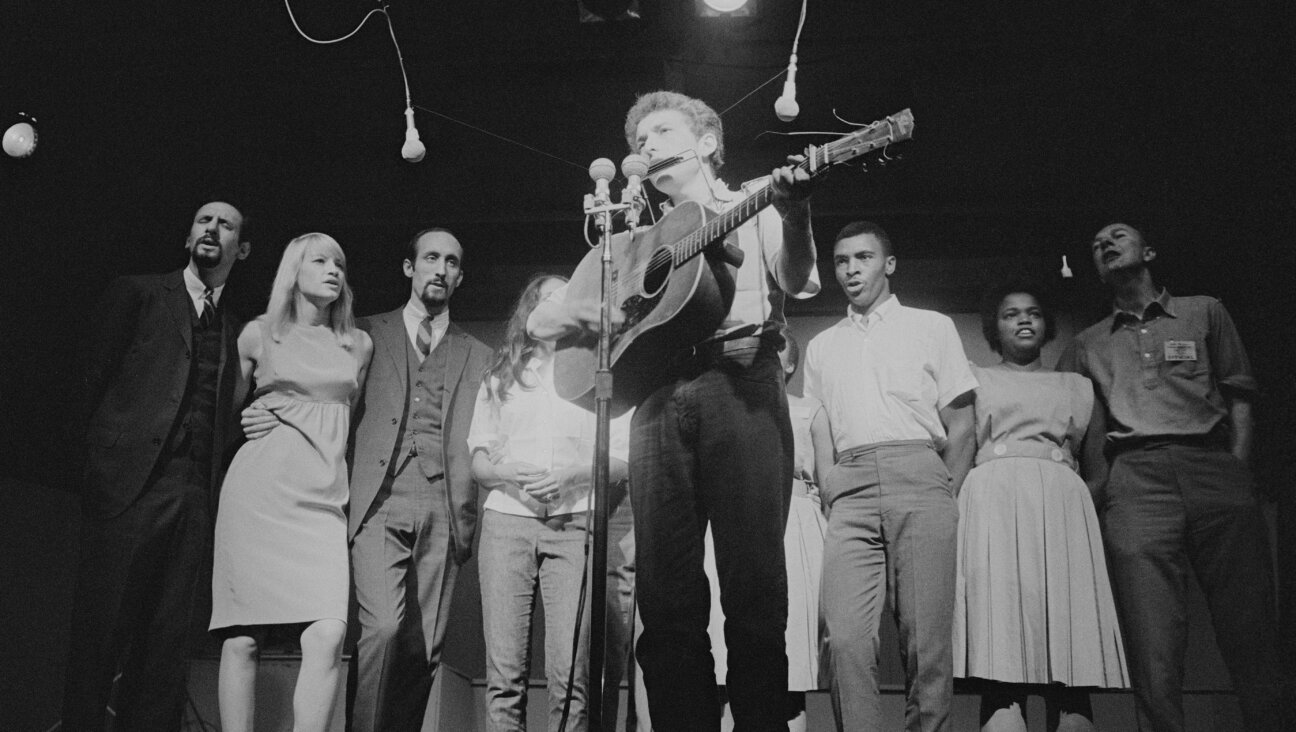Remembering Andre Previn — Who Transcended Nebbish-Hood As A Master Musician

Conductor Andre Previn Image by Getty Images
In recent years, the musicianship of André Previn — the conductor, pianist, and composer of German Jewish origin who has died at the age of 89 — has finally been celebrated more than his once-hectic personal life. Previn was formerly married to the songwriter Dory Previn, actress Mia Farrow, and violinist Anne-Sophie Mutter, among his five wives, which unfairly distracted journalistic attention from his real, noteworthy professional achievements. “Classic Andre Previn,” a 55-CD set reissue from Sony Classical of his recordings for RCA and Columbia should place the focus back where it belongs.
I recall sitting up front at a Previn concert in New York in the early 1970s. The maestro slouched onstage with Beatles-length hair, wearing an odd sleeveless vest instead of the usual formal jacket. A Balabosta sitting near me bellowed to her neighbour in a voice audible across several rows and perhaps onstage too, as Previn winced at the sound she made: “What a nebbish! He looks like Woody Allen!”
This unkind comment was somehow prescient, given that after Previn and Farrow broke up, she would have a long-term affair with Allen, which ended when he began a relationship with Soon-Yi, the adoptive daughter of Previn and Farrow. This cluttered personal history, although catnip for the tabloids, overshadowed the fact that Previn was born Andreas Priwin in prewar Berlin. He graduated from Goldschmidt School, an elite institution for young Jews who had been excluded from public schools in pre-war Nazi Germany. As his biographers Michael Freedland and Martin Bookspan noted, his father, a lawyer, insisted that young André play through symphonic works at the piano every evening. The boy was instructed to ignore mistakes, but always keep going. A sense of continuity and forward progress became a hallmark of Previn’s best performances.
Previn was so well-trained that soon after he arrived in Hollywood as a teenage refugee, he was hired to perform musical tasks by film studios. The creative apogee of his Hollywood composing career, as described in a 1991 memoir, was likely Billy Wilder’s “The Fortune Cookie” (1966). Previn’s score created a portrait in sound of the shyster lawyer Whiplash Willie Gingrich, played by Walter Matthau in an Oscar-winning performance.
Previn was no less fluent in composing and performing light jazz, such as the popular “Like Young” (1959). This sassy, insouciant tune was invigorated on record by the rhythmically alert conducting of David Rose (born Rosenberg), who wrote the raucous instrumental “The Stripper.”
If less vivid than Rose’s “Stripper,” Previn’s jazz pianism was nevertheless fluent and facile, breezing along while usually sharing few emotional confidences. His emotionally discreet style suited Eisenhower generation fans, who purchased guidebooks to learn how to be cool and “Play Like Andre Previn.”
Jewish musicians were an essential part of his gaining further expertise. In 1959, he accompanied the pop singer Dinah Shore (born Fannye Rose Shore of Russian Jewish origin) for a TV broadcast with an appealing gentleness. He also sought advice on conducting classical repertoire from the French Jewish maestro Pierre Monteux.
Previn’s finest hours on the podium may have been his recording sessions from 1975 with the Polish Jewish virtuoso Arthur Rubinstein. Aged 88, Rubinstein played concertos by Grieg, Chopin, and Saint-Saëns. with sovereign assurance, despite suffering from visual problems. Previn snuck glances at Rubinstein to make sure he was ready to start, as if not quite believing that the legendary pianist was really his soloist.
Even with a younger virtuoso, the cellist Nathaniel Rosen, Previn offered a cradle of sound in a televised performance from 1978, broadcast as part of the underrated PBS series “Previn and the Pittsburgh.” Delivering a noble version of Strauss’s “Don Quixote,” Rosen had recently won the Tchaikovsky Competition in Moscow, the only American cellist so honored. As Rosen would tell an interviewer in 1996, his award was all the more surprising because he was not just an American hero, but a “Jewish one too, which was very important at that time because there was a wave of anti-Jewish persecution in Russia.”
For some listeners, Previn’s 1970s concerto recordings with the violinist Itzhak Perlman in his early prime represented another apogee. Of these, the bravest was doubtless Previn helping Perlman confront the Oedipal challenge of following the recording of Jascha Heifetz in the virtuosic Sinding “Suite.” If not quite as superhuman as Heifetz, Perlman’s “Sinding,” as seconded by Previn, set a remarkable standard.
In less death-defying repertoire, Previn and Perlman also produced a genial, sprightly version of the concerto by Karl Goldmark, son of a 19th century chazan from Keszthely, Hungary. Still, the violinist Nathan Milstein, led by Harry Blech communicated more Yiddishkeit and dramatic urgency in the same work.
More than just excelling as an interpreter of Jewish composers, Previn proved a hamish colleague for star musicians of his day. Another compelling episode of “Previn and the Pittsburgh” featured tributes to Previn’s fellow Jewish soundtrack composers, including Bernard Herrmann and Miklós Rózsa. Previn conducted a dainty and polished version of Herrmann’s music from the Alfred Hitchcock film “Psycho” (1960), compared to grittier, more visceral versions led by Herrmann himself. Previn confided to the Hungarian Jewish composer Miklós Rózsa that “Benny” Herrmann was a “superb film composer and pound for pound, the most eccentric human being I ever met.”
In the same “Previn and the Pittsburgh” episode, Previn also honored Jerry Goldsmith (1929 –2004) a screen composer of Romanian Jewish origin. Striving to decrease the distinction between high and low forms of culture, “Previn and the Pittsburgh” also devoted an instalment to the musicals of Stephen Sondheim.
Declaring that Sondheim’s latest work, “Pacific Overtures,” (1976) was his most operatic so far, Previn said that he would not be surprised if one day Sondheim’s works were staged in opera houses worldwide. Sondheim’s next musical, “Sweeney Todd: The Demon Barber of Fleet Street” (1979), would indeed be performed as an opera. Perhaps Sondheim gave Previn a glimpse of Sweeney-in-progress, making this prescience possible?
The real discoveries of the “Classic Andre Previn” set might be long-out-of-print recordings of Mendelssohn piano concertos with soloist Joseph Kalichstein, as well as a bold rendering of American Jewish composer George Rochberg’s arch-modernist violin concerto with soloist Isaac Stern. There is also a “Mendelssohn Piano Trio No. 1” alongside veteran Jewish musicians of an earlier generation, the violinist Feri Roth and cellist Joseph Schuster, both refugees, like the Previn family, from Fascist Europe. Previn’s most Jewish quality may be his career-long awareness of a heritage of great performances of the past, as well as the cultural sources of musical style. A decade ago, he expressed disdain in “The Guardian” for performers who dismiss such cultural roots, chiding the superstar Chinese pianist Lang Lang: “It’s a circus act, you know? Why doesn’t he just come out and juggle?”
Juggling multiple careers in music while surviving an eventful personal life and nebbish-hood, André Previn became an elder musician of the sort he kvelled over in his youth.
Benjamin Ivry is a frequent contributor to the Forward.
















